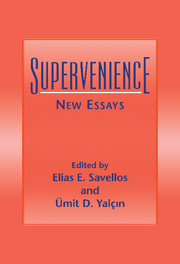Book contents
- Frontmatter
- Contents
- List of Contributors
- Introduction
- Varieties of Supervenience
- Supervenience: Model Theory of Metaphysics?
- “Global” Supervenient Determination: Too Permissive?
- Weak Supervenience Supervenes
- The Tweedledum and Tweedledee of Supervenience
- Reduction in the Mind of God
- Psychophysical Supervenience, Dependency, and Reduction
- Supervenience Redux
- Nonreducible Supervenient Causation
- Physicalism, Supervenience, and Dependence
- An Argument for Strong Supervenience
- Arguments for Supervenience and Physical Realization
- Supervenience and the Essences of Events
- How Does Ontology Supervene on What There Is?
- Supervenience and Intentionality
- Supervenience, Coherence, and Trustworthiness
- Does Truth Supervene on Evidence?
- Index
How Does Ontology Supervene on What There Is?
Published online by Cambridge University Press: 29 March 2010
- Frontmatter
- Contents
- List of Contributors
- Introduction
- Varieties of Supervenience
- Supervenience: Model Theory of Metaphysics?
- “Global” Supervenient Determination: Too Permissive?
- Weak Supervenience Supervenes
- The Tweedledum and Tweedledee of Supervenience
- Reduction in the Mind of God
- Psychophysical Supervenience, Dependency, and Reduction
- Supervenience Redux
- Nonreducible Supervenient Causation
- Physicalism, Supervenience, and Dependence
- An Argument for Strong Supervenience
- Arguments for Supervenience and Physical Realization
- Supervenience and the Essences of Events
- How Does Ontology Supervene on What There Is?
- Supervenience and Intentionality
- Supervenience, Coherence, and Trustworthiness
- Does Truth Supervene on Evidence?
- Index
Summary
This essay's title may seem paradoxical. Ontology is what there is; so how can there be a question about the relation between the “former” and the “latter”? The answer lies in distinguishing two types of ontological questions. Consider a philosophy professor who is wondering
(1) Will any of the students in my seminar have brown eyes?
This sentence can be taken in more than one way. The first way is to take it as
(2) Will any of the students in my seminar be brown-eyed?
where (2) is indifferent to the ontological status of eyes but is to be answered affirmatively just in case not every student in question is either eyeless, or blue-eyed, green-eyed, hazel-eyed, etc. On the second construal (which is the type this essay will give to sentences of this sort), however, (1) asks a question that is different from (2) and receives an affirmative answer iff the empirical conditions necessary for an affirmative answer to (2) are satisfied and eyes have the ontological status of being entities. I will call questions of the sort expressed by (2) “ontological-basics questions” and questions of the sort expressed by (1), on the second construal, “ontological-status questions.”
This distinction must be distinguished from several other distinctions. It might be tempting to say ontological-basics questions are empirical, while ontological-status questions deal with matters that go beyond empirical facts. But this would be a mistake.
- Type
- Chapter
- Information
- SupervenienceNew Essays, pp. 264 - 272Publisher: Cambridge University PressPrint publication year: 1995
- 1
- Cited by



